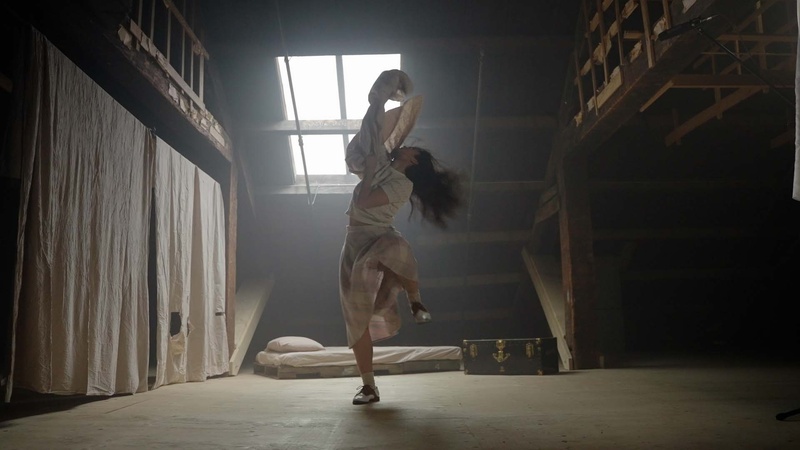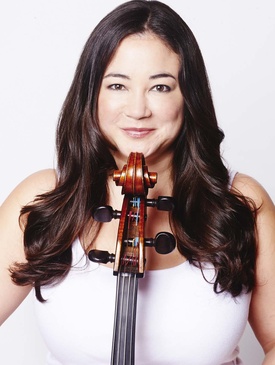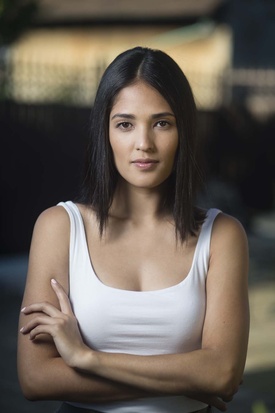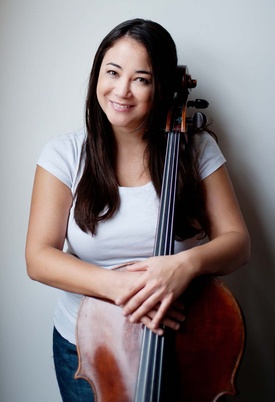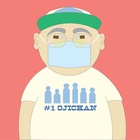As we approach the second anniversary of Covid, I am conscious of the fragility of these times that we are living through: the new Omicron variant of Covid, eco-disasters in British Columbia (flooding and landslides after a summer of wildfires) and, yes, Covid numbers are climbing again across Canada. It’s time again to take yet another deep breath…
In this part, we’re celebrating the artistry of cellist Rachel Mercer (Ottawa, ON) and dancer Mayumi Lashbrook (Toronto, ON), younger members of the Japanese Canadian community, each of whom is mixed race and with different relationships with their Japaneseness. Each are well versed in the use of social media, technology and digital swagger that really seem to be the hallmarks of this generation of JC Millennials, indicators that a massive social media/communication shift has occurred, but how this will impact the self-identifies of these Japanese Canadians is yet to be seen. More importantly, perhaps, is how our local and national JC organizations will adapt to the new realities of what is “Japanese Canadian” and what might unite us as a national community in coming generations?
First introducing Toronto-based Mayumi Lashbrook, whose grandfather and his immediate family ‘moved’ from Strawberry Hill, BC to a sugar beet farm in Manitoba when he was 11. They stayed there for a couple years before going to Japan. Her grandfather returned to Canada when he was 19 and slowly brought the family back together in Toronto. Mayumi’s grandmother (nee Sumioka) and her family were also interned but, as she says, “I don’t have specifics on their journey although I know it followed a similar displacement that involved going to Japan and coming back to Canada after the war.”
Next is Rachel Sachiko Mercer, Principal Cello of the National Arts Centre Orchestra in Ottawa, ON and Artistic Director of "5 at the First" Chamber Music Series in Hamilton, ON. She is a Yonsei on one side, and, on the other, mixed Jewish/Ukrainian/Israeli/ British heritage, growing up in three locations across Canada.
“My musical training has been through European classical tradition, so artistically I have not had many chances to connect in that way to my JC heritage. I have been grateful for support from the community, and have had the opportunity to perform for different retirement communities across Canada, and recently am involved in ‘Kimiko’s Pearl’ with Bravo Festival Niagara, a multimedia project telling a family’s personal story during the war. I think most of my connection to the community comes through listening to my parents, uncle, grandparents, great aunts and uncle’s stories, and absorbing that into my being and understanding of where I come from, and hopefully growing in understanding and compassion for all human beings, which I also hope enriches my ability to understand the music that I study and share.”
* * * * *
Dancer/Choreographer Mayumi Lashbrook (Toronto)
How is COVID-19 affecting how you do your art?
At first, I felt the pandemic was a container for constant creativity. I was inspired to dance and create every day. I experimented freely and played. I let my impulses be loud and followed them to their fullest potential. They led me to film myself, curious about the ways a lens would translate my ideas. This fascination sparked a renewed way of choreographing which I dove into head first. The pandemic offered me time to explore my love of dance on film, especially for a self-recorded camera.
I’ve also found myself checking in with my physicality to offer clues to my mental state, especially in the times that it’s been more fragile. I notice that when I don’t know how to describe a thought, my body is ready to be the translator. The impulse to start from my body first has grown stronger with each day and I cherish the catalogue of sensitivities this time has provided me with.
How is Covid affecting how you think of yourself as an artist?
I have subconsciously let the amount of dance I do define my artistry. But it is not the regularity of it, instead the authenticity of my inner desires that makes me a dance artist. The performing arts sector was one of the first to close and has been among the last to open. This fragility has sadly always been present in our Western working environment. My own personal resilience to keep at it has surprised and delighted me. My company and I ran classes, free morning movement series and choreographed online almost immediately. We worked in our living rooms and became artists-in-residence in an art gallery that was closed but willing to host our bubbled trio. I found myself deeply enjoying the volume of dance suddenly in my day that ironically was more than usual. These shifts help me see that quantity doesn't matter, whether it's in the high or lows of activity. The calling lives within me and exists with or without the stage.
Defined by Bone TRAILER
Are there themes that are preoccupying you at this time?
The global racial reckoning has brought to light so much of my own journey to find belonging as a biracial Nikkei. Primarily, I question how my family’s experience of alienation during the Japanese Canadian internment has influenced who I am in the present moment. These connections call out to me to keep digging internally, keep asking questions, keep looking to the past to understand the future. It feels like my lens has refocused; what I once overlooked has now become the core of my focus. And so I tell the story of my family every chance I get. I clock the power dynamics in each room I walk into. I seek projects with other Japanese Canadians and IBPOC artists. My next major project is an immersive experience that will bring the audience through the internment through dance, projection and sound. I’m honed in on voicing my particular mix of experiences and the knowledge that comes from my ancestors, sharing them as far as I possibly can.
What is one societal change you would like to see when we emerge from the Covid pandemic?
I feel there are many things that have and will shift; acceptance, welcoming, individuality, to name a few. And to me, they all collide in one pivotal idea: people over productivity. Building ways of caring for each other more deeply and personally feels needed. We’ve had a chance to align in time, together experiencing a seismic shift. And it’s revealed our ways of living that have been dehumanizing. When we work from a place of deep care, deadlines drop away and our diverse needs are placed at the forefront.I hope our past goals of productivity and profit fade into the background. People over productivity and centring communities of care can be our new way forward.
*Artist's Facebook & Instagram
* * * * *
Cellist Rachel Sachiko Mercer (Toronto)
How is COVID-19 affecting how you do your art?
As a performing musician, the most immediate thing that happened was that live concerts were all cancelled. This meant that for survival, we all had to find another way of communicating music to the audience. Like many, I quickly did the best I could to learn to record myself, create virtual videos, and try to connect to the audience that way. I’m very much an amateur, but looking back at the videos from March 2020, and what I did months later, there was obviously a huge learning curve! Recording has always been a part of my life as a musician, but video recording is another level, and is of course completely different from live performance. First of all, you’re in your living room, not a sound-proof studio or beautiful hall, and there isn’t the stimulus of other musicians to feed off of or adjust to… and knowing that it will all be pieced and stitched together afterward…the feeling of the whole was so much harder to achieve when playing. There were many aspects of it I liked – some of the creativity and learning to edit a little, being challenged to find repertoire that could work alone or in a virtual creation, being able to reach audiences directly from my home to theirs in videos or live streaming, or even Zoom concerts, and actually having to listen to yourself back over and over again – I think many of us learned much about our delivery and ways of playing. One funny thing that a lot of us noticed coming back to live playing and teaching is that we all played so quietly!! Our phones and other recording devices are made to pick up sound so strongly, we had gotten used to playing for the mics.
How is Covid affecting how you think of yourself as an artist?
Not that struggle and difficulty were not on our planet before, but for me the global impact and struggle with Covid really pushed forward those questions of the relevancy of what I do. I know that art has been a part of humanity always, and people are born and die every day, but as this was hitting us all, it was hard to always feel that recording some music to put out there was doing any good in the world. I did continue though and created what I could, and also did my best to use whatever platform I had to help support those in the music world who were not as fortunate as me, whose gigs had all been cancelled and who were out of work completely. While there are so so many tough stories that happened and are still happening, it was heartening to see colleagues step up and supporting others, even by just donating money when possible. And at least in Canada, the musicians unions did their best to create support funds, trying to help the communities survive. I guess how I would answer this question directly is that I think I finally realized that me, as an “artist”, is not a single individual on her own. I am part of an incredible global community, not only of musicians, but of all artists, and that connection is part of the whole point of creating.
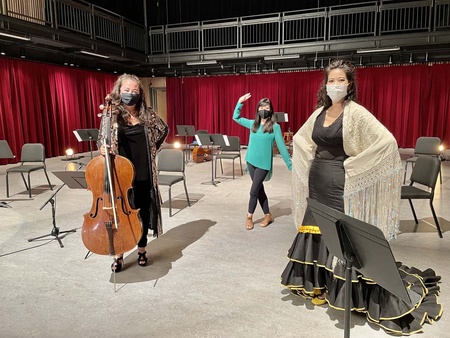
Are there themes that are preoccupying you at this time?
I’ve always said that performing music is like connecting to some universal vibration that exists and that connects us all. And that listening to music, or experiencing music is like tapping into it, or like “getting on the train” of that vibration and being carried along a story, or transcending this physical and material life. More than ever I seek that connection and deeper meaning in the sounds I make with the music I play. When the moments happen when I am able to let go of my thinking mind and just be in that moment of experiencing the music, the vibration that is connecting everyone there, that is when I think I get closest to the meaning of it all.
What is one societal change you would like to see when we emerge from the Covid pandemic?
We are clearly all in this together. There are so many ways in which people all over the world have worked together to survive during the pandemic. I hope that this banding together and connecting across so many boundaries continues, and that we all really feel that while we are all on our own journeys and the protagonists of our own lives, we are all truly connected, and have so much more in common than any of our differences.
Facebook | Instagram | Twitter
© 2021 Norm Ibuki


